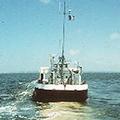新海洋公約上路 嚴格規範海拋
 一項保護力道更強的新國際海洋法將在本月24日生效,針對海上廢棄物的傾倒(海拋作業)進行管理限制。根據預警原則,新法令亦明列了污染者須支付污染損害的規定。此外,這是有史以來第一次海洋法將海床上的廢棄物列管,如海上設施的廢棄使用及倒塌,都包括其中。
一項保護力道更強的新國際海洋法將在本月24日生效,針對海上廢棄物的傾倒(海拋作業)進行管理限制。根據預警原則,新法令亦明列了污染者須支付污染損害的規定。此外,這是有史以來第一次海洋法將海床上的廢棄物列管,如海上設施的廢棄使用及倒塌,都包括其中。
這項新的國際法規稱作倫敦公約之1996議定書。倫敦公約於1962年簽署,也被稱做《防止傾倒廢物等物質污染海洋公約》。
1996議定書自墨西哥批准議定書之後30天起生效。墨西哥是第26個批准的國家,該國駐英國大使布雷墨爾在2月22日將批准文件遞交「國際海事組織」(IMO)倫敦總部。
美國同樣也是倫敦公約締約國之一,惟至今尚未批准1996議定書。其餘倫敦公約締約國當中,已批准1996議定書的國家有英國、紐西蘭、澳大利亞、加拿大、埃及、法國、德國、挪威、西班牙和南非等國。
1996議定書規定,除核准名單中所列物質以外,其餘物質一律禁止傾倒於海洋中;這正好與1972年的倫敦公約相反──1972年公約的規定是:除了明訂禁止傾倒的物質以外,其餘物質均不受管制。
國際海事組織秘書長米特羅普洛斯對墨西哥批准協約一事表示歡迎,強調預警原則將首次應用於海洋污染。
1996議定書將逐漸取代目前有84個締約國的1972倫敦公約。這表示在施行上兩份協約將有段共同施行的時間,不過隨著越來越多締約國的批准,往後的重心會逐漸轉移到1996議定書。
1996議定書更具限制性。該議定書聲明成員國「應禁止傾倒任何廢棄物或不在例外名單上的任何物質至海洋中。」
在議定書規範下,可以傾倒至海洋中的物質如下(除此之外均禁止海拋):
- 疏浚物質
- 污泥
- 漁業垃圾或漁業加工處理過程產生之物質
- 船艦、作業平台或其他海上人造設施
- 無生或無機的地質材料
- 天然有機物質
- 主要由鋼、鐵、水泥或其他類似無害物質所構成的大體積物件。前述所指「無害」僅考量其物理性衝擊。同時,允許海拋的條件僅限於該物件製造地須符合以下要件:如孤立社區的小島,因除了棄置於海上之外無法有其他可行的棄置管道。
其他資訊可參考倫敦公約網站http://www.londonconvention.org/。
1972年公約和1996議定書詳細內容可以在倫敦公約網站上下載:http://www.londonconvention.org/Documents.htm#Texts_of_the_London_Convention。
而若發現海上違法傾倒廢棄物事件,可見以下網站得知舉報方式:
http://www.londonconvention.org/Incident_reporting_forms.htm。
A new and more protective set of international rules governing the dumping of wastes at sea will take effect March 24. Based on the precautionary principle, the new rules also include the principle that the polluter must pay for damages. For the first time, a maritime treaty will govern storage of wastes in the seabed, as well as the abandonment, or toppling, of offshore installations.
The new rules are defined by the 1996 Protocol to the London Convention, formally known as the Convention on the Prevention of Marine Pollution by Dumping of Wastes and Other Matter, 1972.
The 1996 Protocol takes effect 30 days after its ratification by Mexico, the 26th country to do so. The Ambassador of Mexico to the United Kingdom Juan José Bremer, deposited his country's instrument of ratification at International Maritime Organization (IMO) Headquarters in London on February 22.
While the United States is a Party to the London Convention, it has not ratified the 1996 Protocol. The United Kingdon is a Party to both agreements as are New Zealand, Australia, Canada, Egypt, France, Germany, Norway, Spain and South Africa, among others.
The 1996 Protocol prohibits dumping at sea, except for materials on an approved list. This contrasts with the 1972 Convention which permitted dumping of wastes at sea, except for those materials on a banned list.
IMO Secretary-General Efthimios Mitropoulos welcomed Mexico's ratification by emphasizing that for the first time the precautionary principle will be applied to marine pollution.
The 1996 Protocol gradually will replace the 1972 Convention, to which 84 governments are currently Parties. This means, in practice, that both agreements will be in force in parallel for some time, but the momentum will shift to the Protocol as more and more Parties ratify it.
The 1996 Protocol is more restrictive. It states that the Parties "shall prohibit the dumping of any wastes or other matter with the exception of those listed."
Under the protocol, the only materials that may be dumped are:
• Dredged material
• Sewage sludge
• Fish waste, or material resulting from industrial fish processing operations
• Vessels and platforms or other man-made structures at sea
• Inert, inorganic geological material
• Organic material of natural origin
• Bulky items primarily comprising iron, steel, concrete and similar harmless materials, for which the concern is physical impact, and limited to those circumstances where such wastes are generated at locations, such as small islands with isolated communities, having no practicable access to disposal options other than dumping.
London Convention website: http://www.londonconvention.org/
The text of the 1972 Convention and the 1996 Protocol can be downloaded from the London Convention website at: http://www.londonconvention.org/Documents.htm#Texts_of_the_London_Convention
People who observe a dumping incident at sea are encouraged to report it. Find out how at: http://www.londonconvention.org/Documents.htm#Texts_of_the_London_Convention
Information and Links
Join the fray by commenting, tracking what others have to say, or linking to it from your blog.


這是國際海洋規範的重大轉變
以往海洋一直被人類當作「用之不竭」的超大垃圾場,什麼垃圾往其中一拋,眼不見為淨,什麼事都沒發生過一般拍拍屁股就走。
從報導中看,1996議定書最大的轉變,就是對可海拋物質的規範,從以前的「負面表列」(表列內的物質不能丟),改變成「正面表列」(表列內的物質才能丟),限制嚴格許多,這是國際間基於預警原則,對海洋管理的一大起步。
這麼重要的海洋新聞,卻只見貴報有報導,其餘號稱大報則無人聞問,令人不禁悲嗟:我們配稱海洋國家嗎?
資料來源:http://e-info.org.tw/node/4648